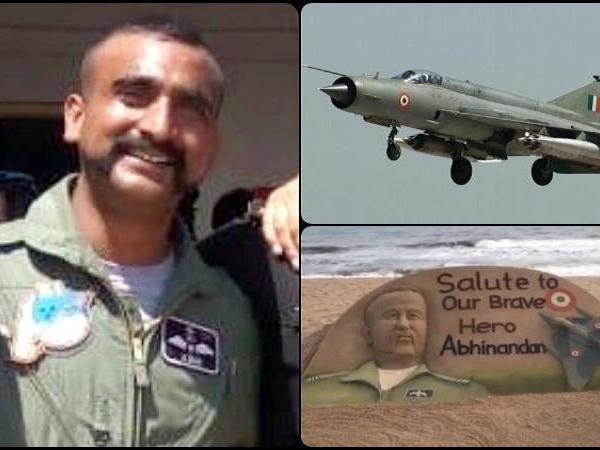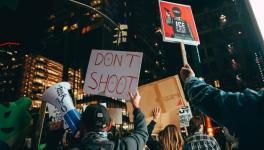India, Pakistan Have Made Their Points, High Time For Diplomacy: Experts

Image Coutesy: Times Now
New Delhi: The entire country is celebrating the release of Indian Air Force Wing Commander Abhinandan Varthaman who was taken into custody by Pakistan’s ground forces after his fighter jet (MiG 21) was shot during a dogfight to repel a Pakistani attack on February 27 amid heightened tensions between India and Pakistan.
The tension between the two nuclear power countries escalated following the ghastly attack on Central Reserve Police Force (CRPF) soldiers at Pulwama in Jammu and Kashmir on February 14. Attack took place after a heavy explosive-laden vehicle hit the fifth bus from front of the 78-vehicle convoy plying on Srinagar-Jammu highway carrying around 2,500 jawans. At least forty men in uniform lost their lives in the strike. Pakistan-based terror group Jaish-e-Mohammed (JeM) – which is active in Kashmir – claimed the responsibility for the attack.
Following public outrage, India had carried out an aerial strike at Khyber-Pakhtunwa’s Balakot on February 26 – 12 days after the Pulwama strike – by crossing the Line of Control (LoC), the de-facto border between India and Pakistan. The “non-military” and “pre-emptive” strike – as it was described by the Government of India – by the Indian Air Force was retaliated by the Pakistan Air Force the next day with an air action against India’s military assets. While doing so, sources said, the pilot, Wing Commander Abhinandan was captured by Pakistani forces.
Pakistan’s Prime Minister Imran Khan announced in a joint session of Pakistan National Assembly on February 28, “As a peace gesture, we are releasing the Indian pilot on Friday (March 1).”
What next now?
Newsclick spoke to military veterans, former diplomats and experts of strategic affairs to know what should be the future course of action on part of India. All of them said there should be de-escalation of the situation, as nothing can be achieved with war and it’s high time for both the nations to show maturity and come to the negotiation table to resolve issues. Diplomacy must step in now, they said.
Air Vice Marshal (retired) Kapil Kak said that the two nuclear nations must not go for a war because it will serve no purpose. “Every war has to have an objective. The Indian military action had a different rationale because Pakistan repeatedly struck our positions in the past two years. Almost six or seven major terrorist attacks took place in the period. India, other than surgical strike in response to Uri, has always handled situations with a great deal of restraint as a bigger and more responsible power. Pulwama was the last straw that breaks the camel’s back. Something had to be done. Public opinion was very strong. The political leadership was saying that they are going to give a ‘munh tod jawab’ (fitting reply). And what was done was very wise, well thought out and concentrated attack on a major facility where terrorists used to be trained,” he said.
Pakistan – he said – had to meet requirements, compulsions and pressure from its own domestic constituency, and therefore, they had to retaliate. “There was no doubt about it. At Surgical Strike’s time, they did not retaliate. But little later, they stepped up the pressure through terrorism. But this one was an attack on mainland Pakistan, and not in PoK. We may have said that it was non-military and pre-emptive, but it was done by crossing the boundary between the two countries. The action by Pakistani military was justifiable, but to acquire brownie points, they captured a pilot who was shot down by the Pakistani aircraft. They released his photos and videos to the word to show how reasonable they are,” he said.
Also read: Pulwama Aftermath: As India-Pak Tensions Increase, Panic Grips Kashmir
Giving a piece of advice, Kak said, “I think objectives of both the nations are met, India for having retaliated and Pakistan for also having retaliated. They should now put an end and exercise restraint to cool down the situation very thoughtfully.”
“It’s high time for diplomacy to step in. Diplomacy until Pakistan shows evidence of winding down terror factories, terror actions. India has to continue economic, diplomatic, psychological pressure on Pakistan. India must also realise that it must do it as a package, and not just Pakistan-centric action,” he added.
Major General (retired) Amin Naik Ipsi said, “As a soldier, I reiterate that war is not a solution in the present condition. We are not going to achieve anything if we have a war now. Best way today is dialogue at different levels. Yes, there is a situation on the border that will remain. But I know Indian Army very well, and I am sure they will not want war. As a nation, if have to go for a war, then they will go ahead. We have everything and the preparedness that is required. But war is definitely no solution. It will kill more people. It will have destruction. Economy will go down. As peace brings prosperity, we should avoid armed confrontation as much as we can. I hope the same sense will prevail in Pakistan and it will address India’s concern of cross-border terrorism,” he said.
Both countries – according to him – are very powerful and India is way more powerful. And therefore, peace and dialogue are the option. “It’s high time that diplomacy should take over. The might has been shown. Military force is a threatening beam to show you that we have might and we can do what is feasible. And that we have already demonstrated by entering into their territory, and it is more than sufficient,” he added.
Major MG Devasahayam – who has also served as an IAS officer – cautioned the media to maintain restraint, and let the diplomatic channels take charge. “It is the media that is constantly trying to vitiate the atmosphere with its war mongering and provoking the establishments on other side of the border. I ask TV journalists: Who gave you figures of the casualties that did not even take place following the military action by India? Why don’t you want de-escalation, which is the need of the hour? Why are you misreporting a gesture of peace?” he said.
Also read: India-Pakistan: Revenge, Response and Retaliation
Ex-diplomat KP Fabian, who has served as ambassador to Madagascar, Austria, Iran, Sri Lanka, Canada, Finland, Qatar and Italy, said that the purpose of diplomacy is to prevent war. “It is the business of diplomacy to put an end to a war by ensuring that the interests of warring parties are taken care of. Now, the ongoing conflict between India and Pakistan is far from a war, but it can lead to a war. Therefore, it is time for diplomacy to step in. Imran Khan has already made an offer. Though it may not be a perfect offer, and we may also say that in the past, we have come across double speak on the part of Pakistan, we will have to be realistic and if there is an offer to talk, then it is necessary to talk,” he said.
He further said, “India carried out an attack. While India might say that it was directed against terrorists under training, yet the fact remains that Pakistan does not see it that way, and it gave a reply. Further, military action on our part will only escalate the situation and provoke an armed action from other side of the border without leading to any solution, and not without the risk of escalation beyond control. The only law in history is the law of unintended consequences. If India does not want war, Pakistan has also agreed that it does not want the same. Even if they start, then we have to defend ourselves, and we will prevail for sure. If we prevail, and the Indian Army marches across the LoC, then there is no doubt at all in my mind that the United States will call upon both the nations to stop it. And if Pakistan agrees, it will be more than impossible for India to disagree. So, what will we gain? Therefore, be cool and calm and perform diplomatically.”
Asked how a dialogue should be initiated, he replied, “We have a high commission in Pakistan, and Pakistan has the same in New Delhi. So, use classical diplomacy. I don’t think India should engage any other country for mediation. By doing so, we are not going to get anything.
He also cautioned the media and politicians that war mongering by them and using the military action for political gains will only vitiate the situation.
SNM Abdi, former deputy editor of Outlook magazine, who writes on national security and foreign policy issues, thinks that the way forward is by holding talks, as there is no substitute for diplomacy. “At present, there appears to be stalemate and we need to de-escalate it. I think talks have to be initiated and the differences have to be sorted out because if we go ahead and fight, young men from both the countries will get killed and we don’t want youth to get killed,” he said, adding that “I think bilateral talks are the best option and governments of the two countries have to decide at which level they want to talk. Whether it is Mr Modi talking to Imran Khan or whether high commissioners of both the nations who would start talking or the two foreign ministers. It is for the governments to decide. But I would essentially favour a bilateral engagement”.
Also watch: Diplomacy Trumps War
Asked about the offers of mediation, he said, “I would be totally opposed to any external mediation because there are a lot of countries which would like to have a say in what is essentially a bilateral affair. And all these countries have their hidden agendas. America would like to sell weapons to both India and Pakistan, and they want to score brownie points. Similarly, Saudi Arabia will have its own agenda. It appears to be a friend of Pakistan, which it is entitled to be. It had offered to mediate even before, but we had firmly told them no. I think the same position should be maintained. While all the help and good words are welcome at this juncture, we have to fight our battle alone whether it is diplomatically or militarily.”
Asked about the politicisation of the military action – which is apparently going on – to win elections, he added, “I think politicisation of war is even dirtier than war itself, and it has to stop at any cost. We should not use our soldiers to win elections and what the BJP is doing is absolutely shameful. I condemn and detest it.”
Professor Ujjwal K. Chowdhury, who heads the School of Media at Pearl Academy, and writes on foreign affairs, advocates the same – “de-escalation, de-escalation and de-escalation”.
“War is not in the interest of anyone. Both countries have made their points. India retaliated to the Pulwama massacre very strongly. Pakistan wanted to prove that any incursion in its airspace will not go without a reply. Both have made their points, and there is no point in taking it further militarily,” he said.
He thinks that India has already gained to an extent diplomatically. “France, the United Kingdom and the United States have condemned terrorism. France has even named Jaish and its chief Masood Azhar to be sanctioned by the United Nations Security Council (UNSC). So, India has diplomatically gained. Even China – in addition to Saudi Arabia – has criticized terrorism, without naming Masood Azhar, being harbored on the Pakistani soil. Therefore, all these factors should be taken into consideration. India should now go openly through diplomatic way with through its partners to ask for a probe into the Pulwama incident,” he added.
In addition, he said all issues of Kashmir should be brought on the negotiation table, and a comprehensive dialogue should be held at two levels – government to government and military to military. “By military to military level of engagements, I mean de-escalation of tensions between the two countries should be discussed,” he clarified.
Asked is it in the interest of both the nations to engage a third-party mediation as several countries, including France, has already offered, Chowdhury said, “There could be a third party supervised investigation into the Pulwama massacre or in fact probe on cross-border terrorism but dialogue should be bilateral. In addition, India should also take steps to solve Kashmir problems internally and taking up the issues of Kashmir’s development and integration with the main stream are the much stronger way to address the conflict than what it has been done in the recent times.”
Get the latest reports & analysis with people's perspective on Protests, movements & deep analytical videos, discussions of the current affairs in your Telegram app. Subscribe to NewsClick's Telegram channel & get Real-Time updates on stories, as they get published on our website.
























